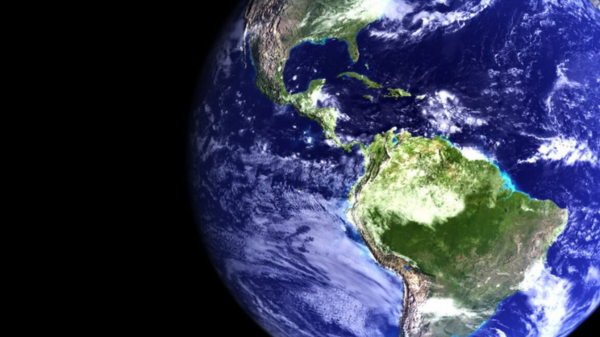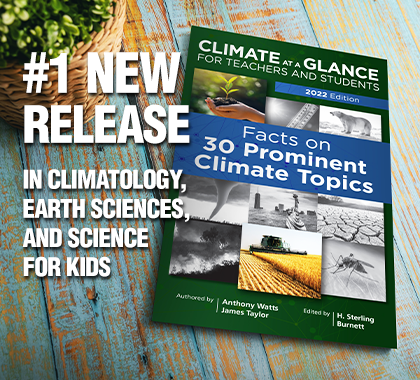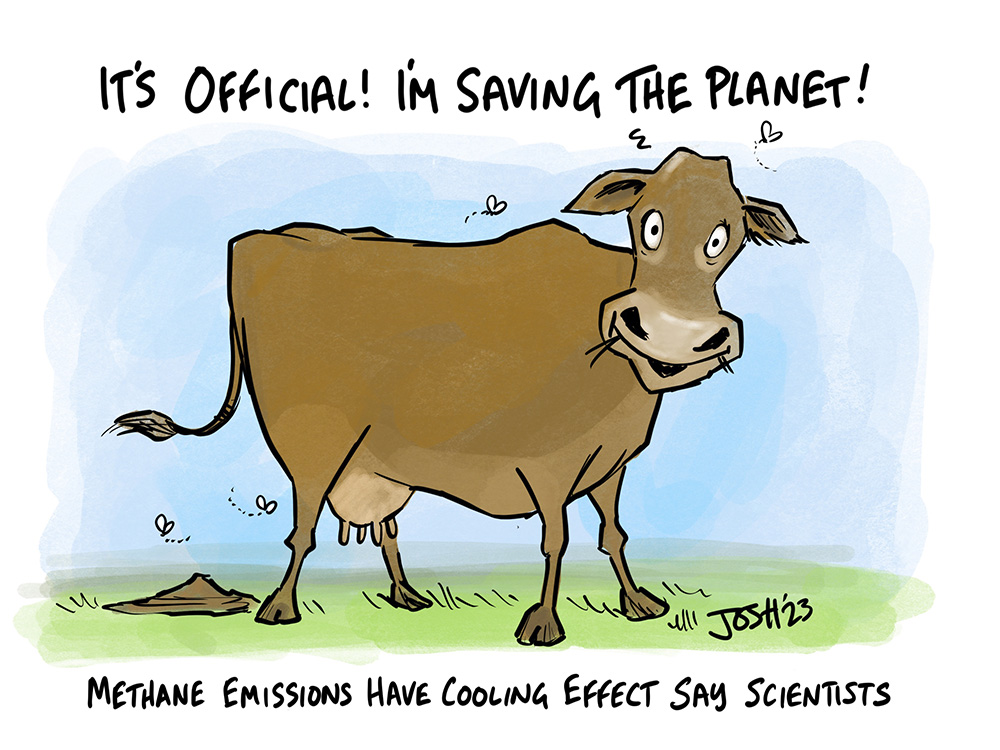YOU SHOULD SUBSCRIBE TO CLIMATE CHANGE WEEKLY.
IN THIS ISSUE:
- New Survey Shows Climate Concern Is Declining
- Podcast of the Week: Big Banks Net Zero Proxy Proposals are Bad for People, Energy Security and the Economy (Guest: Paul Chesser)
- New Survey Shows Climate Concern Is Declining
- Warming Is Half of What Climate Models Project, New Satellite Analysis Confirms
- Video of the Week:Calling All Climate Activists This Earth Day!
- BONUS Video of the Week: Why People Don’t Care About Climate Change
- Climate Comedy
- Recommended Sites
Miss Anything at Heartland’s Climate Conference? No Problem.
New Survey Shows Climate Concern Is Declining

The public is hammered daily with a barrage of stories across all media platforms—print, online, and broadcast—claiming humans are causing catastrophic climate change and only wrenching economic change, requiring giving government more control over our lives, can prevent it. It is like the fabled Chinese water torture—the drip, drip, drip of climate alarm—and it has been going on for decades.
Despite this, or perhaps in part because of it, recent opinion polls show the public is becoming less convinced humans are causing climate change. Nor has all the coverage seemed to have moved the needle with regard to where climate change ranks when compared to other political issues of concern, or how much people are willing to pay to fight climate change.
Poll after poll, after poll, since climate change became an issue of public debate in the late 1980s, show a few things fairly consistently. In general, depending upon the poll, a majority of people accept that climate change is happening. If not a majority, at least a large percentage of people believe humans are primarily causing climate change. Climate change consistently ranks at or near the bottom of the issues of concern for the public. And most people are unwilling pay much to fight climate change.
In all the years since global warming came on the scene as the environmental bête noire, surveys show public opinion on the matter just hasn’t changed much; and, perhaps more alarming to climate scolds than climate change itself, one prominent recent poll indicates that across all political allegiances, belief that humans are the main cause of climate change is declining, after inching up over most of the past decade.
A recent survey on climate attitudes conducted by the Energy Policy Institute at the University of Chicago and the Associated Press-NORC Center for Public Affairs Research (UC/AP), finds “a majority of Americans believe climate change is real and the pace is increasing, but fewer believe it is mostly or entirely caused by humans.”
People who have experienced extreme weather events falsely attributed by the mainstream media to climate change, skew these numbers. Among those who haven’t experienced an extreme weather event since the last UC/AP poll was taken, just 64 percent think climate change is happening, and only 43 percent of them think it’s mostly caused by humans. Even among those who have experienced an extreme weather event, 54 percent think it is mostly caused by humans and only 51 percent think climate change will affect them personally. The latter number suggests that a significant number of the people who’ve suffered harm from extreme weather events are smart enough to see through the media’s lies about climate change being responsible for every tornado, flood, and hurricane. Many of them apparently recognize instead that extreme weather is natural. By contrast, only 32 percent of those who have not been impacted by extreme weather think climate change will affect their lives.
The steep decline in the number of people of all political persuasions who believe humans are responsible for climate change is probably the most alarming take-away from the UC/AP poll for climate alarmists and politically connected green energy profiteers. Politicians regularly warn that human-caused climate change poses an “existential threat” to humanity and the planet. And news consumers face a daily barrage of stories linking one type of disaster or another on climate change. Yet the UC/AP poll indicates the daily propagandizing isn’t having its desired effect.
Among Democrats surveyed, the number who believe climate change is caused by humans fell from 72 percent in 2018 to 60 percent today, a 12-point decline. Among those identifying as independents, belief in human caused climate change plunged 19 points, from 61 percent in 2018 to 42 percent today. The number of Republicans believing humans are mostly responsible for climate change held steady 33 percent over the same time-period. Overall, according to the survey, there are now more people who don’t believe humans are mostly responsible for climate change than do, falling from 60 percent who believed in human-caused climate change in 2018 to just 49 percent believing the same today.
In my opinion, where the rubber hits the road concerning climate change has always been: Where does climate change rank in comparison to other public policy issues the public cares about; and how much are people willing to pay to fight climate change? Once again, the answers to these questions provide no comfort to those asserting climate change is the most important danger facing humanity.
Ask the public about almost any policy issue frequently in the headlines and poll respondents will say it is important: clean air, crime, economic growth, education, health care, immigration, jobs, retirement, taxes, terrorism, and more. People say they are all important. However, what we really need to know is how important each issue is relative to other matters of concern. In a world of limited resources and voter attention, government must focus on what the public is most concerned about and what will motivate them when they go to the polls.
A recent Pew Research survey provided more than 5,000 people with a list of 21 top concerns or priorities, asking them to rank which of them they believe “should be a top priority for the president and Congress to address this year.” Unsurprisingly, as they often do, “strengthening the economy” and “reducing health care costs” topped the list.
“Dealing with climate change,” although not in last place where it resides in most previous polls, was near the bottom of the list, at 17th. Only 37 percent of those polled by Pew said it should be a top priority. This represented a decline in concern from Pew’s 2022 poll, when dealing with climate change ranked 14th out of 18 priorities, with 42 percent of those polled saying it “should be a top priority for the president and Congress to address.”
Shifting back to the UC/AP survey, it confirms once again that most people—by which I mean the vast majority—are unwilling to pay almost anything to fight climate change. Indeed, UC/AP reported that:
Americans’ willingness to pay a fee to combat climate change fell to the lowest level since the APNORC/EPIC poll began tracking these data in 2016.
Just 38 percent of Americans said they would be willing to pay $1 for a monthly carbon fee, down 14 percentage points from 2021.
Not even $12 a year to save the Earth from destruction, really!
Support for a carbon fee drops from there. As the proposed fee is increased support declines. Just 29 percent of people would be willing to pay $20 a month to fight climate change.
The UC/AP’s and Pew’s respective survey results are consistent with the results of past surveys ranking climate change. For example, a mid-2010s survey conducted by the United Nations, with more than 7 million respondents from 195 countries (making it the largest sample size for any climate-related survey I am aware of) asked participants to rank 16 priorities. A quality education ranked first and “Action Taken on Climate Change” ranked dead last, receiving 300,000 fewer votes than “Access to Telephone and Internet,” which finished 15th on the list.
Polls indicate that even when a majority of respondents think climate change is a dire emergency, they are unwilling to pay much to fight it.
For example, in a 2019 survey conducted by Tthe Washington Post and the Kaiser Family Foundation, 60 percent of survey respondents said they believed the world had less than 10 years to prevent the worst effects of climate change—with most of those respondents claiming the world had two years or less to act. Also, 70 percent of respondents were “very” or “somewhat” worried climate change would harm the health of Americans.
Despite this, 51 percent of those surveyed were “somewhat” or “strongly” opposed to paying a $2 monthly tax on U.S. residential electric bills to pay to fight climate change. Similarly, 61 percent would reject a 10 cent per gallon increase in the gasoline tax to fight climate change. The number of respondents opposed to electric bill fees and gas tax hikes rose sharply when the proposed fees were increased: 71 percent opposed a $10 monthly tax on U.S. residential electric bills, and 74 percent oppose increasing the gas tax by 25 cents per gallon.
To be clear folks, these relatively modest cost increases are far below the multi-thousand-dollar annual household price increases the Biden administration has already imposed on American households in its efforts to fight climate change.
Does this mean many respondents are fatalists? Or, does it suggest that when push comes to shove and hard-earned money is on the line, they don’t truly think a climate apocalypse is actually pending? I don’t know.
I’ve said it before, and I’ll say it again. Concern about climate change is a mile wide and an inch deep. The people have spoken, if only the politicians would listen.
Sources: EPIC/AP; Climate Change Weekly; Climate Change Weekly; Pew Research Center
Podcast of the Week
In this podcast, H Sterling Burnett converses with guest Paul Chesser to discuss the interventions of climate woke special interest in our banking system. Specifically, they discuss how these groups and investors have offered shareholder proxy proposals to force big banks to adopt net zero targets and reporting, and to cease banking with companies in the fossil fuel industry. If successful, these efforts will drive up costs, reduce employment, undermine U.S. energy security, and bankrupt a vital industry, while doing nothing more than enrich elite bankers and green energy profiteers.
Subscribe to the Environment & Climate News podcast on Apple Podcasts, iHeart, Spotify or wherever you get your podcasts. And be sure to leave a positive review!
Get your Copy at Amazon TODAY!
Data Refutes Claims the Earth Is Spiraling Toward a Climate Crisis

The Global Warming Policy Foundation has updated its “State of the Planet” report for 2022. The report, written by Ole Humlum, a former professor of Physical Geography at the University Centre in Svalbard, Norway, and emeritus professor of Physical Geography at the University of Oslo, indicates ongoing climate change is not causing a crisis.
Every chapter in the report is informative, but the chapters on the impacts of warming on sea levels, snow and ice, and tropical storms or hurricanes, are critical.
On sea levels, the important takeaway is that seas are continuing to rise, as they have since the end of the last ice age, but the current rate of rise is not accelerating. Humlum writes:
Sea level is monitored by satellite altimetry and by direct measurements using tide gauges situated along coasts. While the satellite-derived record suggests a global sea level rise of about 3.4mm per year or more, data from tide gauges all over the world suggest a stable average global sea-level rise of 1–2mm per year. The measurements do not indicate any recent acceleration (or deceleration). The marked difference … between the two datasets still has no universally accepted explanation, but … satellite observations of sea level are complicated in areas near the coast. … Either way, for local coastal planning, the tide-gauge data is preferred.
Although sea ice in 2022 remained below the average for the satellite era since 1979, it continued a trend of increasing or stable sea ice levels since an unusual minimum in 2016, which was likely caused by a combination of shifts in two different oceanic cycles coinciding that year.
Snow cover in the Southern Hemisphere, which is controlled by the Antarctic ice sheet, has remained relatively stable since the 1970s, reports Humlum. In the Northern Hemisphere, average snow cover extent has also “been more or less static since the onset of satellite observations,” reports Humlum, who goes on to note that there are large local and regional variations from year to year. In the Northern Hemisphere, since 1979, there has been a modest shift, with autumn snowfall increasing, winter snow accumulations remaining about the same, and spring snow extent slightly declining. Snow cover in 2022 was near the 1972 through 2021 seasonal average.
For hurricanes and tropical storms, Humlum’s analysis confirms what data cited in numerous Climate Realism posts show: climate change has not caused hurricanes or cyclones to become more numerous or stronger.
Source: Global Warming Policy Foundation
Warming Is Half of What Climate Models Project, New Satellite Analysis Confirms

New research published in the Journal of Geophysical Research-Atmospheres confirms the rate of tropospheric warming is approximately half the rate projected by climate models since the advent of satellites monitoring temperatures began in 1979.
Temperatures in the troposphere, the atmosphere 1 to 10 kilometers above the Earth’s surface, are important for an accurate understanding of global temperatures because they are unaffected by the urban heat island effect and other artificial changes to the Earth’s surface or biases introduced by the manner in which temperatures are recorded for the oceans. Climate models assume the anthropogenic warming signal should be strongest in the lower and mid-troposphere. If that is true, this new paper should dampen fears that dramatic change is occurring.
Since the 1990s, the data sets from both weather satellites and weather balloons have demonstrated that surface stations and climate models alike project too much warming, with the model projections being even higher than the temperatures measured at the surface stations. The new paper, by a team of researchers from the National Oceanic and Atmospheric Administration (NOAA), the University of Maryland, and George Mason University, essentially confirms the models are running way too hot.
After running satellite data through a new empirical method that merges data from individual satellites and adjusts for satellite drift, the team at the Center for Satellite Applications and Research (STAR) found the amount of warming per decade was even lower than previous satellite datasets found, and thus lower still than climate model projections.
The newest data from STAR finds the mid-troposphere has warmed about 0.09 ℃ per decade, compared to existing satellites managed by the University of Alabama at Huntsville (UAH), which recorded a slightly higher 0.1 ℃ per decade of warming, and Remote Sensing Systems (RSS) satellites, which display 0.14 ℃ of mid-tropospheric warming per decade.
In the authors’ words, the new analysis has “strong implications for trends in climate model simulations and other observations.” Why? Because the rate of warming it records is only half of that projected by climate models over the same period, and models are used to proclaim a climate catastrophe will occur if we exceed 1.5 ℃ of average warming for the planet.
If this research is correct, it is likely the equilibrium climate sensitivity (EQS), the temperature increase one should expect from a doubling of atmospheric carbon dioxide assumed in climate models, is double the actual EQS. This is something scientists working with The Heartland Institute have long maintained, based on their own research.
Sources: Journal of Geophysical Research: Atmospheres; Financial Post
Heartland’s Must-read Climate Sites
Calling All Climate Activists This Earth Day!
On Earth Day, Heartland’s Linnea Lueken has a heart-felt message for climate activists, telling them they should be aware that the policies they support might not be good for humanity.
Why People Don’t Care About Climate Change
In this video, H Sterling Burnett discusses results from a recent climate change poll taken at the University of Chicago, surveying for a basic question: How much do adults care about Climate Change? The results demonstrate that the mainstream media’s barrage of climate extremism is failing. In reality, the constant fear-mongering is having the opposite effect. The results show belief in anthropogenic climate change and the willingness to pay for climate change policies have declined measurably across party lines in recent years.
Climate Comedy
via Cartoons by Josh































